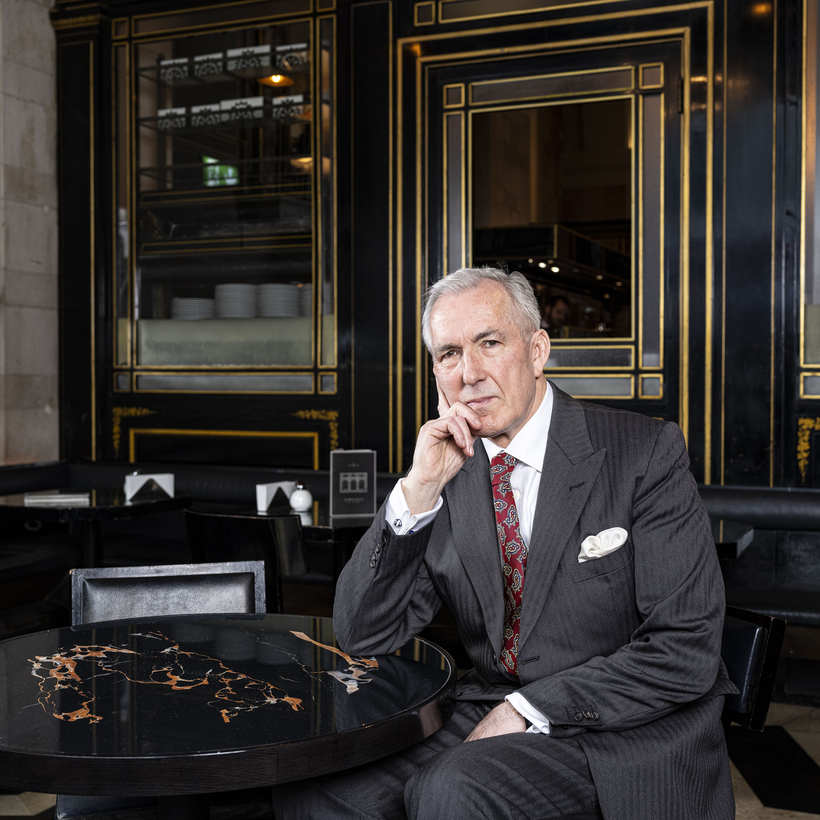Jeremy King does not usually go in for fighting talk, in the same way that the Dalai Lama tends to avoid a bar brawl. The man behind London’s most beloved restaurants is known for his overawing cordiality and calm; a relaxed rigor, even among the heat and tumult of a fiery kitchen.
To see him shimmer across the marbled floor of the Wolseley—a bastion of civility that makes the Ritz next door look like … well, anything but the Ritz—is to observe some high priest of sweetness and light at work. (A private joke with Joan Collins here; a kind recommendation to a lost Texan there.) But today, as he fights for control of the restaurant group that bears his name, King has his dander up. “If you wish to avoid a war,” he says, “then don’t start a battle.”

The skirmish in question is with Minor International—a Thai hotel conglomerate and the majority backers of the Corbin & King restaurant group, which King set up with his partner Chris Corbin back in 2003. (Other restaurants under this umbrella include Colbert, on Sloane Square, and the Delaunay, on Aldwych.) In short, it all hinges on a $51.5 million loan.
Minor demands that Corbin & King repay the historic sum, amid claims that the restaurant group is insolvent and can’t keep up with its financial obligations. King, meanwhile, insists that this is simply a cynical power grab from the Thai financiers—and that it stems from a wider disagreement over how the Corbin & King portfolio at large should be run.
“The real breakdown came because they were trying to insist that I sell franchises of the Wolseley into different regions,” King explains. “I’d be perfectly happy to take the Wolseley abroad,” he says. “But it’s just about how it’s done. The problem with franchises is that you do lose control.”
It all hinges on a $51.5 million loan.
(The rumors go that Saudi Arabia was high on the Minor wish list, “which is sort of depressing and crass,” Giles Coren, The Times of London restaurant critic, tells me. “The two main things about the Wolseley are that it’s on Piccadilly and that Jeremy is always there. Once you take those two things away, you’re frankly left with the schnitzel—and I don’t see the point in selling that to the Arabs, really … ”)
King explains that the financiers urged him to “sack all the staff” during the pandemic (“which I didn’t”), and that they fundamentally disagreed over the running of the company. “Their attitude was that if someone offers you money, you should take it,” King continues. “Mine was that, if someone offers you money, you should do a lot of due diligence, and think about the overall repercussions.”

The result is that Corbin & King has now been dragged into administration, a legal process where a business is financially restructured by outside appointees in a bid to save it. And London’s chattering classes have entered a sort of Blitz mentality, with many wrongly assuming that the restaurants themselves will soon be shutting up shop. In effect, it is just the Corbin & King parent company that is being troubled for the loan. “We’re trading very well—in real terms, better than ever before,” King says. Reports of the Wolseley’s death, in other words, have been greatly exaggerated.
Cue an almost Diana-grade outpouring of grief across Instagram and the broadsheets, with many declaring their unwavering devotion to the restaurant group and to the Wolseley in particular. “I have been blown away by the amount of support that has come in through media and social media,” King says. “It is gratifying—but also helpful.” This, he insists, along with the “wisdom of experience,” has helped him remain philosophical amid the storm. And there is a sense, King tells me, “that whatever happens, we’ll find a way through.”
The blood, however, may have just begun to simmer. Last week, The Sunday Times of London reported that Richard Caring’s Caprice Holdings—the rival Mayfair hospitality group behind Sexy Fish, Annabel’s, and the Ivy Collection—had met with Minor to discuss a potential acquisition of the Corbin & King restaurants, and that the talks pre-date the current financial administration. (Caprice Holdings did not respond to a request for comment.)
For some, a Caring intervention is a fate worse than death for the likes of the Wolseley. After the terra-cotta-hued former cloth merchant took control of the Ivy and the Caprice (owned and operated during their 1990s pomp by King and Corbin), he began gradually to turn the Ivy from a singular West End society honeypot into a middle-market regional chain. “The world has not been impressed by it,” Coren says. “The rollout that Caring has done has been dismal.” (It is telling, perhaps, that on the morning I spoke with King, a press release arrived in my inbox announcing the imminent launch of a Sexy Fish Miami.)
More to the point, King and Caring could not be further apart in temperament or taste. The former is softly spoken and attentive—a restaurateur of a former era who visits each of his sites every day to check on the fall of a tablecloth or to wish happy birthday to a 90-year-old regular.

The latter is a more fragrant character, who has built his impressive empire via aggressive acquisitions and splashy openings—and runs his operations from the boardroom rather than the restaurant floor. “He’s an all right bloke,” says Coren. “But the idea that he might go about buying the things that Jeremy has made, and make them shit, is a bit depressing.”
The rumors go that Saudi Arabia was high on the Minor wish list.
It’s this precise sentiment—and the ensuing outpouring of love for Corbin & King—that might yet dissuade Caring from signing on the dotted line. The general mood, among sources close to the Wolseley, is that the existing regulars would not touch a Caring version with a barge pole.
And while King has been in talks with the U.S. investment adviser Knighthead Capital Management to help refinance the loans with minimal disruption, to some degree the fate of the company is beyond his control. “It’s in the hands of the administrator, and who knows what offers they might have?”
But fine words butter no parsnips. “This must be the toughest setback of my career,” King concludes. “But, for all the different adversities, perhaps I’m at my calmest.” There is a sense, too, among those I speak with that King will prevail, and that the natural order of the universe—eggs Benedict done just right, Bill Nighy at his regular table—will soon be restored. But I ask him, just in case, what he would do should the unthinkable occur. “Whatever happens, I’m not going to retire,” he says. “I’m too young—and too determined.” Even if King loses the battle, in other words, one suspects he’ll win the war.
Joseph Bullmore is a Writer at Large for AIR MAIL and the editor of Gentleman’s Journal in London


